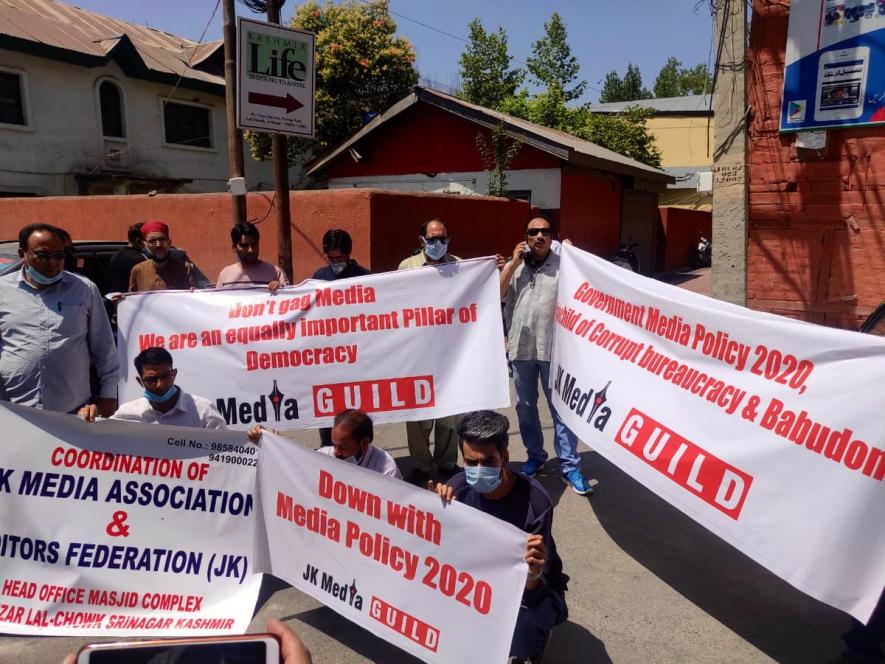Jammu: New Media Policy Wants Journalists to ‘Sing Praises of the Ruler’

Protest against New Media Policy 2020 in Srinagar,Kashmir. | Image Courtesy: Twitter
The new media policy introduced by the Jammu and Kashmir administration last month has elicited sharp reactions from journalists in Jammu. While the policy has drawn huge flak from journalists in Kashmir who have demanded an immediate rollback, few journalists from Jammu have also come out strongly against it.
The new “Media Policy-2020” gives unbridled power to the government to check content of news reports and decide what constitutes “fake, anti-national and unethical”.
The policy allows the Department of Information and Public Relations (DIPR) to monitor the media, and action can be initiated against an individual or an organisation.
“Any individual or group indulging in fake news, unethical or anti national activities or even plagiarism shall be de-empanelled besides being proceeded against under law,” the 53-page policy document reads.
“Ever since this policy has come up – as an editor – every story I come across, every story I look at, I bear in my mind that this could land my reporter in the lock-up,” said senior journalist Zaffar Chaudhary, the Editor of The News Now, a broadsheet newspaper in Jammu. “Who is the Government to find out what is fake news and what is anti-national. Fake news has to be determined by independent bodies which are outside mainstream media and outside the government control system,” he added.
Another senior journalist who works with a leading national newspaper said the policy is an attempt to “gag the voice of journalists. The government wants the journalist to become their mouth-piece. If I report something tomorrow which cannot be digested by the government, they can book me under draconian laws. This policy is an attempt to scuttle the freedom of press,” he added.
Choking the Space for Journalism
The new media policy details an elaborate mechanism for the “Empanelment” of newspapers. It carries mention of a “background check” for empanelling newspapers/news portals for the “release of advertisement by the government.” Journalists will also be included in the “verification carried out with the assistance of relevant authorities” before they are accredited. This process is aimed to ensure that news outlets meet specified standards set by the government before rolling out any advertisements to them.
There will be “no release of advertisements to such newspapers, publications, and journals which incite or tend to incite communal passions, preach violence, violate broad norms of public decency or carry out any acts or propagate any information prejudicial to the sovereignty and integrity of India,” the media policy reads.
Pallavi Sareen, a young journalist from Jammu and the Editor of news portal Straight Line, demanded that the policy be rolled back. “When someone registers their own newspaper or magazine they already go through verification. Otherwise their newspaper does not get registered. Due to this media policy, one has to go through verification again if one wants advertisements, which I think is ridiculous and an unnecessary hassle that journalists have to go through. In my personal opinion, it should be rolled back,” she said.
The policy document also invokes law and order problems in the erstwhile state as the reason to regulate journalism. “J&K has significant law and order and security considerations. It has been fighting a proxy war supported and abetted from across the border. In such a situation, it is extremely important that the efforts of anti-social and anti-national elements to disturb the peace are thwarted,” the media policy reads.
Anuradha Bhasin, Executive Editor of Kashmir Times, said that the policy “is going to completely silence, blackout and even kill journalism.” Bhasin said that there were two ways of going about it. “First is to completely choke the finances of the organisation that is refusing to toe the line. Second, for individual journalists who are not toeing the line, the whole argument of fake news and being anti-national can be used against them,” she added.
Bhasin said that that the policy defies the grounds on which journalism is founded. “The job of a journalist is to act as a public watchdog and hold the government accountable. This policy completely reverses that. The government is holding the journalist accountable,” she said
Role of Media
The new media policy asks media persons to “focus on creating a sustained narrative on the functioning of the Government in media.” Bhasin explained that the role of media is to bring to the fore the voice of the marginalised, and not act as a PR agency for the government. “Journalism is supposed to act as a bridge between the ruler and the ruled. But with new media policy we are only supposed to sing praises of the ruler. That completely reduces media to a PR agency. And the government already has PR agencies. Why do they need more?” she asked.
Another senior journalist from Jammu, who wished to remain anonymous, said the role of the journalist was to write about the ills of society. “The government wants to intimidate journalists who dare to write about the evils of society. Journalists are pushed to a position where they have to seek permission before publishing. They do not want the real picture to reach the outside world, as far as Jammu and Kashmir is concerned,” the journalist said.
Why has Jammu been silent?
Two days ago, a group of journalists had staged a protest in Srinagar, demanding a roll-back of the new media policy. Journalists in Kashmir have been vocal about the danger the policy poses after it was unveiled on June 2, but reactions from Jammu have been largely muted. Prominent journalists bodies like the Press Club of Jammu are yet to issue any official statement on the policy.
NewsClick spoke to Ashwani Kumar, President of Press Club of Jammu, who said that they were going through the media policy and will be in a position to comment after a few days. NewsClick tried to speak to several journalists to find out the reason behind their silence. Many refused to comment, a few supported the policy, while others expressed their reservations.
“Jammu does not have a vast body of independent journalists like Kashmir. Most of the people are with established newspapers who were already following the policy which was operational in an undeclared form,” said Chaudhary.
“Most of these newspapers run on government advertisements and government press releases. They have come up with the provision that there will be penal action against a story which the government thinks is not a good story. Who you think would talk against the policy?” asked Chaudhary.
Another journalist from Jammu, who requested anonymity, said, “Everyone feels betrayed by this media policy but the journalists here are bound by limitations.”
When asked, a senior journalist from Jammu said: “I don’t want to be dragged into any controversy.”
Get the latest reports & analysis with people's perspective on Protests, movements & deep analytical videos, discussions of the current affairs in your Telegram app. Subscribe to NewsClick's Telegram channel & get Real-Time updates on stories, as they get published on our website.























